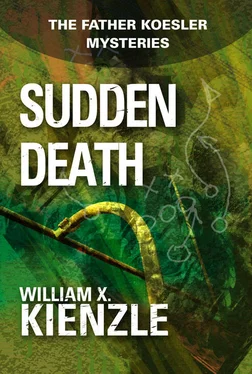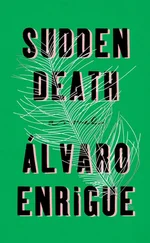William Kienzle - Sudden Death
Здесь есть возможность читать онлайн «William Kienzle - Sudden Death» весь текст электронной книги совершенно бесплатно (целиком полную версию без сокращений). В некоторых случаях можно слушать аудио, скачать через торрент в формате fb2 и присутствует краткое содержание. Жанр: Криминальный детектив, на английском языке. Описание произведения, (предисловие) а так же отзывы посетителей доступны на портале библиотеки ЛибКат.
- Название:Sudden Death
- Автор:
- Жанр:
- Год:неизвестен
- ISBN:нет данных
- Рейтинг книги:4 / 5. Голосов: 1
-
Избранное:Добавить в избранное
- Отзывы:
-
Ваша оценка:
- 80
- 1
- 2
- 3
- 4
- 5
Sudden Death: краткое содержание, описание и аннотация
Предлагаем к чтению аннотацию, описание, краткое содержание или предисловие (зависит от того, что написал сам автор книги «Sudden Death»). Если вы не нашли необходимую информацию о книге — напишите в комментариях, мы постараемся отыскать её.
Sudden Death — читать онлайн бесплатно полную книгу (весь текст) целиком
Ниже представлен текст книги, разбитый по страницам. Система сохранения места последней прочитанной страницы, позволяет с удобством читать онлайн бесплатно книгу «Sudden Death», без необходимости каждый раз заново искать на чём Вы остановились. Поставьте закладку, и сможете в любой момент перейти на страницу, на которой закончили чтение.
Интервал:
Закладка:
Similarly, one could distinguish the football players from the ordinary humans; the players were the ones with no necks, just huge shoulders sloping upward into large heads.
Father Forbes reached that part of the Mass called the consecration. According to Catholic faith, when the priest repeated the words of Jesus at the Last Supper, the bread and wine again were changed into the reality of Christ come again as food for the soul. As Forbes pronounced the words of consecration, so did Koesler in a whisper. Thus, Koesler managed to foil the capricious decision of the Chancery forbidding concelebration at this Mass. It was such an absurd, childish dictum that he felt rather good about violating it.
From his vantage in the sanctuary, somewhat elevated above the floor of the body of the church, Father Koesler could easily see the people in the pews. As Mass proceeded toward communion, he tried to pick out the suspects.
You couldn’t miss Kit Hoffer and Bobby Cobb. Not only were they large; they were both pallbearers and thus in the front row. Hoffer was kneeling; Cobb was seated. Another distinguishing point: non-Catholics seldom knelt in church. Kneeling, for most of them, was foreign to their worship experience. So, while Catholics knelt, non-Catholics sat.
Jack Brown was in the second row, just behind the pallbearers. He seemed ill at ease. Koesler wondered why. Did he find the Catholic ceremony awkward, or was something else troubling him?
The Galloways were seated in about the fourth or fifth row, Koesler could not quite tell which. Jay Galloway seemed. . what? Self-satisfied?
Marj Galloway was not satisfied. That was obvious and so was her reason for being upset. Koesler was certain that if she could have carried it off without attracting too much notice, she would not be here. And if she could have helped it, she would not be sitting next to a man she no longer loved. Had Koesler been present at the epilogue to last night’s meeting, he would have understood just how much in fact she despised her husband.
Koesler could not locate Dave Whitman, though undoubtedly he was somewhere in the congregation. Koesler wondered if it would be possible for Whitman and Galloway to continue to work together after the words they had exchanged last night.
The congregation stood for the Lord’s Prayer. Non-Catholics generally have no objections to standing. Then most everyone knelt again as communion time arrived.
Koesler assisted Forbes in distributing communion. Thus he was nearby when Grace Hunsinger received communion from Father Forbes. And thus Koesler was startled when, having received communion, she began to sob and almost collapsed. Instinctively, he moved as if to assist her. But her relatives were quick to come to her aid and support her.
The weeping of this brokenhearted mother finally supplied the somber, bleak character this funeral, until now, had lacked. Hardly anyone in this church lamented Hunsinger’s death. They were surprised, yes, but hardly heartbroken. So, till now, it had been a rather bland occasion at which a number of people were expected to be in attendance and to which many others were drawn by curiosity.
Now, hearing the heart-rending sobs of Grace Hunsinger, everyone was deeply affected. Who could remain unmoved in the presence of a grieving mother?
Koesler could sense, almost tangibly feel, a new awareness of death and grief in the congregation. Somewhere in this church, he was now certain, was the murderer of Hank Hunsinger. Could he or she not be affected by this mother’s desolate tears? Would this not alter the status quo? Would the murderer’s defenses not be lowered? Alight the guilty person not actually be moved to confess?
Although he had not intended to do so, Koesler at that moment resolved to return to the Hunsinger home after accompanying the casket to the cemetery.
Indeed, the priest concluded, it was long past time when he must stop thinking of Henry Hunsinger’s death as a murder investigation in which, by pure accident, he himself was involved. Leave the solution of crime to the experts. One of his duties as a priest, a duty he entirely welcomed, was to at least try to console those who mourn.
The return drive from Holy Sepulchre Cemetery to Holy Redeemer was a long one. Father Koesler had lots of time to think. Deliberately, he forced out of his mind thoughts of the ongoing murder investigation and concentrated on the business at hand: death and dying.
It was in one of the Epistles-Koesler thought it might be Paul’s letter to the Hebrews-but in any case, the Bible stated it clearly: “It is appointed for each man once to die. And after death the judgment.”
After death the judgment.
After death, what?
The question thoughtful humans had been asking through the ages. There could be no doubt that each of us who live will die. Then what? Nothing? Anything? Reincarnation? As a lower form of life? As another human? Or, as the Bible clearly teaches, judgment? Then, heaven? Hell? Purgatory?
No living person, pondered Koesler, can prove the answer to any of those questions. It’s a matter of choosing something in which to believe.
The Christian is offered the Resurrection in which to believe. The Christian is supposed to put all his or her chips on Christ. If Christ did not rise from the dead, then, in St. Paul’s opinion, we are the most to be pitied because our faith is in vain. But, the Apostle goes on to write, the most important reality of all is that Christ did rise from the dead. And if He, human as well as divine, is alive, overcame death, then everyone lives after death. A most consoling faith.
What sort of belief would a person such as Hank Hunsinger have about a life after death? From the little Koesler had been able to learn, he doubted that Hunsinger had given much if any thought to the question. Even though he had somehow found his way into a Bible study group, there was little indication that he thought about death and its consequences at all. It probably was the combination of not being religious along with being young and, though periodically injured, healthy. The Hun would have had no occasion to ponder death and a hereafter.
No matter. Now he knows all the answers.
Although Koesler did not often find himself on the southwest side of Detroit these days, it was easy and reassuring to recognize and remember the old neighborhood. As he drove down Junction Avenue, he passed the stately St. Hedwig’s Church, a Polish parish. Amazing how well the neighborhood had been preserved! So many Detroit neighborhoods had been allowed to deteriorate and decay.
Finally he reached the celebrated intersection of Vernor and Junction and the familiar sprawling brick buildings that were part of the vast plant that was Holy Redeemer. He found a parking space just across the street from the Hunsinger home.
The doorbell was answered by a woman who identified herself as Rose Walker, one of Mrs. Hunsinger’s sisters. Koesler could see the resemblance. “It’s so good of you to come back, Father. We have a buffet set up in the kitchen. Would you like something to eat?”
“Maybe a little later. Right now I’d like to talk with Mrs. Hunsinger for a few minutes, if that’s all right. “
“Of course. I’ll take you to her, Father. She’ll be pleased to see you.”
Mrs. Walker led the way into the living room. Koesler located Mrs. Hunsinger immediately. She was seated near the large front window. Near her sat a man in a straight-back chair. Neither was speaking. Again, from the family resemblance, Koesler guessed it might be her brother.
Mrs. Walker made introductions. Suspicions confirmed; the man was one of Mrs. Hunsinger’s brothers. He excused himself to let the priest be alone with Grace.
Koesler was very glad he had decided to return to the home after the ceremonies. There was almost no one here besides Grace Hunsinger’s immediate family. For most, the special occasion of a funeral had given way to an ordinary Wednesday, and work was waiting. For others, the show was over.
Читать дальшеИнтервал:
Закладка:
Похожие книги на «Sudden Death»
Представляем Вашему вниманию похожие книги на «Sudden Death» списком для выбора. Мы отобрали схожую по названию и смыслу литературу в надежде предоставить читателям больше вариантов отыскать новые, интересные, ещё непрочитанные произведения.
Обсуждение, отзывы о книге «Sudden Death» и просто собственные мнения читателей. Оставьте ваши комментарии, напишите, что Вы думаете о произведении, его смысле или главных героях. Укажите что конкретно понравилось, а что нет, и почему Вы так считаете.












